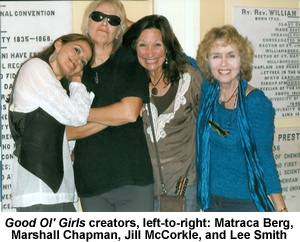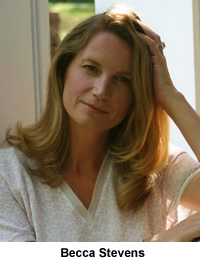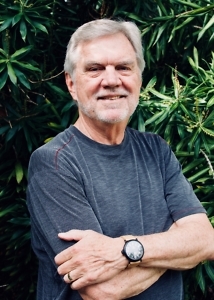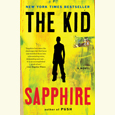Social Justice, Good Ol’ Girl Style
Matraca Berg, Marshall Chapman, Jill McCorkle, and Lee Smith talk with Chapter 16 about their off-Off-Broadway show to benefit Nashville’s Center for Contemplative Justice
Good Ol’ Girls—a musical based on the stories of Jill McCorkle and Lee Smith, with fourteen songs by Marshall Chapman and Matraca Berg—opened at the Black Box Theatre in New York on February 14, 2011, and opening night was a true Valentine to the four women who first began work on the project more than ten years ago. According to a rave review in BackStage magazine, the show featured “a quintet of Dixie divas” who are “post-feminist, post-redneck, and even post–steel magnolia.” As Lee Smith put it in an interview with he Huffington Post, good ol’ girls understand “that big hair and a big heart do not mean a small mind.” And having a big heart doesn’t make a body a pushover, either: “You don’t want to cross a good ol’ girl. She’ll bring you a casserole, but she’ll kill you, too.”
 On December 1, the original good ol’ girls will bring “An Evening of Story and Song”—a more intimate, more improvisational version of the production—to the Belcourt Theatre. The show is a benefit for The Center for Contemplative Justice at St. Augustine’s Episcopal Chapel at Vanderbilt University, the newest initiative of St. Augustine’s chaplain, Becca Stevens. Last month Stevens was named a “Champion for Change” by the White House for her work with Magdalene and Thistle Farms. Chapter 16 recently interviewed all four Good Ol’ Girls creators about their unique collaboration—and their support for Stevens:
On December 1, the original good ol’ girls will bring “An Evening of Story and Song”—a more intimate, more improvisational version of the production—to the Belcourt Theatre. The show is a benefit for The Center for Contemplative Justice at St. Augustine’s Episcopal Chapel at Vanderbilt University, the newest initiative of St. Augustine’s chaplain, Becca Stevens. Last month Stevens was named a “Champion for Change” by the White House for her work with Magdalene and Thistle Farms. Chapter 16 recently interviewed all four Good Ol’ Girls creators about their unique collaboration—and their support for Stevens:
Chapter 16: Good Ol’ Girls has been through at least two different incarnations already—a smaller stage show and a Broadway version. Do you see this project as one that will continually evolve as the four of you continue to grow as artists, or has the show reached its final version?
Jill McCorkle: I hope what started will continue. We are hopeful that the play will continue to run in various venues (it will be produced at Hollins University this spring), and I’d like to think we will continue our version of this spin-off—a showcase of some of the material that pulled the show together way back in the beginning, but also new work that we’re all sampling and trying on. I have loved the collaborative nature of it all.
Chapter 16: How will “An Evening of Story and Song” differ from Good Ol’ Girls?
Matraca Berg: Since the first year we collaborated on this project, our friendship has deepened and evolved, and the version we perform reflects that, I think. We enjoy throwing different readings and songs into the mix just to see how the other girls will answer. This makes for long periods of laughing and not being able to move on for a bit—sometimes it’s crying, though, that stops things. This is by far my favorite gig of the year.
 Marshall Chapman: Good Ol’ Girls (the musical) is a staged production with real actors and a band. It has a script. Since 1998, Lee and Jill and Matraca and I have occasionally performed as “the creators of Good Ol’ Girls,” but it’s not a big production with a band or actors. It’s just us being us—reading, laughing, telling stories, and singing songs. In the beginning, we would mostly do the readings and songs from Good Ol’ Girls, but as time has moved on, we seem to incorporate more of our newer stuff into these performances. Plus, we seem to get looser and—I like to think—better with each performance. So truthfully, I can’t really tell you what will happen December 1 at the Belcourt. All I know is something will happen. It’s always a trip whenever we get together.
Marshall Chapman: Good Ol’ Girls (the musical) is a staged production with real actors and a band. It has a script. Since 1998, Lee and Jill and Matraca and I have occasionally performed as “the creators of Good Ol’ Girls,” but it’s not a big production with a band or actors. It’s just us being us—reading, laughing, telling stories, and singing songs. In the beginning, we would mostly do the readings and songs from Good Ol’ Girls, but as time has moved on, we seem to incorporate more of our newer stuff into these performances. Plus, we seem to get looser and—I like to think—better with each performance. So truthfully, I can’t really tell you what will happen December 1 at the Belcourt. All I know is something will happen. It’s always a trip whenever we get together.
Chapter 16: A review of Good Ol’ Girls in The New York Times basically accused the show of being anti-man. Is this a Yankee-reception problem, a simple misreading of cultural context? What’s your response to that assessment of the show?
McCorkle: Good Ol’ Girls is not “anti-man” so much as it is anti-crap of any kind from any institution. Our good ol’ girl is just as she’s described in the lyrics—she’s tough and kind and dependable. She speaks her mind and is nobody’s doormat. The show is not anti-man so much as it is pro-woman, and there is a difference between the two.
Chapter 16: All of you are literary artists in your own right, but as songwriters only Marshall and Matraca practice a kind of word-craft that is frequently a collaborative art. Was it difficult for Lee and Jill to make the transition from writing in solitude to creating something as part of a team?
Lee Smith: Anybody who has been a writer her whole life long—as Jill and I have—has spent a lot of time shut off in a little room all by herself, looking at the walls and thinking about her childhood, or her first marriage, or some terrible romance she had in the seventies. Or maybe she’s researching something like the Spanish Civil War, or Googling the Melungeons, but no matter how intrigued she is by whatever she’s doing, she’s doing it all by herself. Every book she writes means hours and days and months—years!—all by herself in that little room.
So just imagine how exciting it is when a friend—such as Marshall Chapman—calls up on the phone and says, “Hey! You wanna do a show? I was just talking to Matraca Berg and she’s got this idea….” The correct answer to that question is “Hell, yes!” So then I called Jill, and Marshall and Matraca flew over to North Carolina with their guitars, and the rest is history, or maybe it’s herstory. Anyhow, I have never enjoyed any project so much! And this collaboration seems to be good for all of us, since we all keep producing our own work like crazy, too.
Chapter 16: The four of you must get incessant requests to put on benefit shows like “An Evening of Story and Song”—what drew you to the Center for Contemplative Justice as a cause?
Chapman: How can you turn down something called The Center for Contemplative Justice? It just sounds like something the world needs right now. And when we found out Becca Stevens was involved, well, that pretty much sealed the deal.
Good Ol’ Girls creators Matraca Berg, Marshall Chapman, Lee Smith, and Jill McCorkle will present “An Evening of Story and Song” at the Belcourt Theatre, December 1, at 7:30 p.m. Ticket sales will benefit the Center for Contemplative Justice. Click here for tickets.




